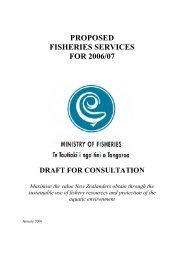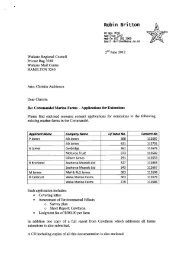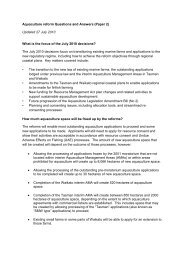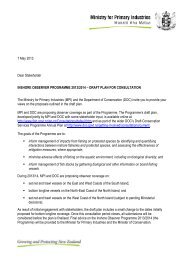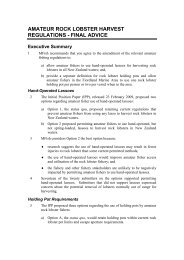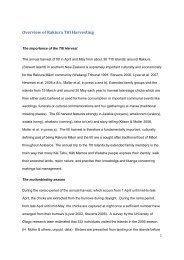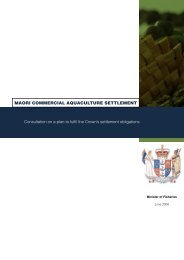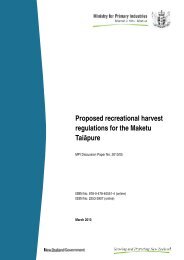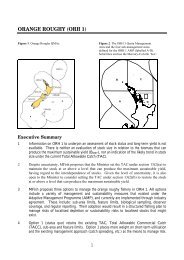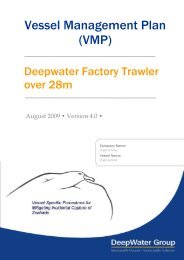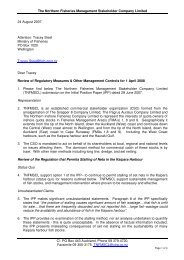review of potting definitions - Ministry of Fisheries
review of potting definitions - Ministry of Fisheries
review of potting definitions - Ministry of Fisheries
You also want an ePaper? Increase the reach of your titles
YUMPU automatically turns print PDFs into web optimized ePapers that Google loves.
107 As outlined in regulation 25C <strong>of</strong> the amateur regulations, recreational fishers<br />
are also subject to person and vessel limits on the number <strong>of</strong> rock lobster pots<br />
that can be used, set or possessed on any one day. These provisions limit the<br />
fishing effort by a single recreational fisher or from one particular vessel. The<br />
limits are intended to help recreational fishers to stay within the daily bag limit<br />
by preventing a catch <strong>of</strong> significantly more than the daily bag limit in a single<br />
set <strong>of</strong> pots. The limits are also a constraint for poachers who may conceal<br />
their activities under the guise <strong>of</strong> recreational fishing.<br />
108 MFish considered the option <strong>of</strong> proposing similar limits to pots used to fish for<br />
species other than rock lobster for the same purpose, but the creation <strong>of</strong> such<br />
limits is not included in any <strong>of</strong> the options presented in this paper. MFish<br />
believes that such limits are not necessary at this time, but there may be a risk<br />
<strong>of</strong> some fishers circumventing the limits on the number <strong>of</strong> rock lobster pots by<br />
using other pots that could, in certain circumstances, catch a rock lobster (e.g.,<br />
blue cod pots). Under Options 2 and 3, MFish would continue to monitor<br />
these risks and would propose further action where necessary. Nonetheless,<br />
MFish encourages stakeholders to comment on the potential need for person<br />
and vessel limits on the number <strong>of</strong> non-rock lobster pots that may be used by<br />
recreational fishers on any one day.<br />
Statutory Considerations<br />
109 In forming the regulatory amendment options the following statutory<br />
considerations were taken into account.<br />
a) Section 5(a) requires decision-makers to act in a manner consistent<br />
with New Zealand’s international obligations relating to fishing,<br />
including the Law <strong>of</strong> the Sea and the Fish Stocks Agreement as well as<br />
regional fishery management agreements. Decision-makers must also<br />
act in a manner consistent with the provisions <strong>of</strong> the Treaty <strong>of</strong><br />
Waitangi (<strong>Fisheries</strong> Claims) Settlement Act 1992. MFish considers<br />
that the proposed options are consistent with both New Zealand’s<br />
international obligations relating to fishing and the provisions <strong>of</strong> the<br />
Treaty <strong>of</strong> Waitangi (<strong>Fisheries</strong> Claims) Settlement Act 1992.<br />
b) Section 8 describes the purpose <strong>of</strong> the Act as being to provide for the<br />
utilisation <strong>of</strong> fisheries resources while ensuring sustainability. The<br />
proposal presents two options to further achieve the purpose <strong>of</strong> the Act<br />
by removing constraints on utilisation caused by the MFish regulatory<br />
interpretation <strong>of</strong> rock lobster pots and assessing the likely impacts to<br />
the sustainability <strong>of</strong> target species and rock lobster fisheries.<br />
c) Section 9 requires the Minister <strong>of</strong> <strong>Fisheries</strong> to take into account that<br />
non-harvested associated or dependent species be maintained at or<br />
above a level that ensures their long-term viability and that the<br />
biological diversity <strong>of</strong> the aquatic environment should be maintained.<br />
Although available information is limited, nothing suggests that the<br />
proposed action adversely affects any associated or dependent species,<br />
as the incidental catch may remain alive and in good condition in pots<br />
and can be returned to the water.



